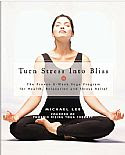Stress in the workplace is common for many of us these days. As organizations strive to adapt to a changing economy, the level of work stress increases. Is job stress something we just have to live with now? Or is it something we can control? Isn't there an ideal job with no stress at all?
Yesterday at my local airport I had the privilege of meeting face to face a woman by the name of Carol Pilon. Carol is no ordinary person. Her profession is wing walking! Yep, that's right! She walks on the wings of an airplane in flight and actually stays there standing on the wing and doing tricks while the pilot pushes the airplane through an aerobatic routine including loops and inversions. This is no ordinary job and I would imagine it's the kind of job that would push job stress beyond any known limits for most of us. But not for Carol. Of course there is some stress involved. Yesterday she was training a new pilot for some upcoming airshows. Everything has to work just right for her routine to work and to ensure a safe completion so efforts have to be made to get it right. That goes with just about every human endeavor. So why am I telling you about Carol?
Well, if Carol can do the job she does and not experience the kind of job stress that pushes her personal stress level over the top, then why can't we? If the worst we have to deal with is some ornery co-worker, then what's the problem? At least our life is not on the line! I guess what I'm saying is this. It's often not the job that causes the job stress but how we relate to the job that causes the stress. If you watched Carol prepare for an airshow you would probably say there is a good level of stress there in the workplace. But it is stress that people like Carol can handle and even thrive upon. So what's the secret?
First and foremost, Carol loves what she does. If you are in a job that you hate, the chances are you will experience work stress. And I can just hear some of my readers saying right now "Well that's OK to say but what can I do about it? I can't just quit this job because I hate it. In these tough times, I might not find another!" And I totally understand. But if that is the case you still have choice. You do have the choice to explore other options and you also have the choice to adapt and find ways to make your job less stressful and more fun. If you choose the latter option, here are some tips that might help. And even if you love your job, these tips will work for you too… even for someone like Carol.
Tips on How to Manage Stress in the Workplace
- Prepare for your day. Spend at least 10 minutes each morning for you to stretch, breathe, meditate, walk, sing, play, or whatever it is that you can find that shifts your energy and your mind from a "Damn! Another day!" to "OK day… here I am! Open and ready!"
- Don't take it personally! When stuff comes up on the job and you find criticism and nasty comments floating around as often happens with workplace stress, just let it roll off. You can even visualize the yucky stuff that comes your way just washing right off your body as soon as it arrives.
- Smile a lot! Find a good reason at least every half hour to show the happy face. It's hard to smile and feel stressed at the same time so for at least a few seconds here and there you will be stress free if you can do this one.
- Breathe! Yes, the old faithful. A deep slow and full inhale followed by big exhale will work wonders to shift how you respond to what's going on around you. Every time you feel the tension building, take a breath break.
- Keep open to the possibility of a major change. Other jobs are out there. Keep your eyes and ears open and don't stop dreaming about the job you really want and the one you would love. Hey… what about wing walking?





